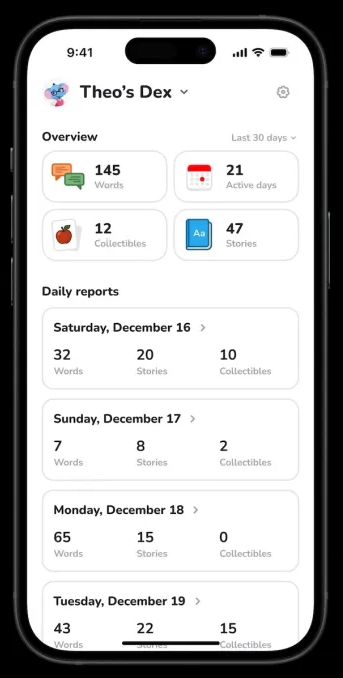When screen time has become a major concern for modern parents, three experienced professionals in the tech industry chose a different path. Reni Cao, Xiao Zhang, and Susan Rosenthal, as parents concerned about their children's overuse of electronic screens, left their comfortable tech jobs and jumped into entrepreneurship, working to develop a product that encourages children to interact with the real world. Their bold move has paid off, with the company recently successfully raising $4.8 million.
The innovative device, called Dex, has just been officially launched. It looks like a high-tech magnifying glass, with a camera lens on one side and a touchscreen on the other. When children use this device to take pictures of objects, AI technology uses image recognition to identify the object and translates the corresponding word into the selected language. In addition to translation, the device offers interactive story lessons and various games, making learning lively and fun.
Although there are already child-focused language learning apps such as Duolingo Kids on the market, Dex believes it adopts a more appealing approach, emphasizing practical experience and allowing children to truly immerse themselves in a language environment. This differentiated positioning has helped Dex stand out in the competitive children's education market.
"We're trying to teach authentic language in the real world through interactive means," Cao said in an interview with TechCrunch. "Children are not just listening or following instructions, but actually thinking, creating, interacting, running around, staying curious about things, and gaining the necessary language skills related to these concepts and objects." This educational philosophy reflects a deep reflection on traditional language learning models.

Dex is designed for children aged 3 to 8 and currently supports multiple languages, including Chinese, French, German, Hindi, Italian, Japanese, Korean, and Spanish. More impressively, it also supports 34 dialects, including Egyptian Arabic, Taiwan Mandarin, and Mexican Spanish, making its language coverage rare among similar products.
In addition to object recognition, Dex also has a rich library of interactive stories, encouraging children to actively participate in the narrative process. As the story unfolds, children are prompted to respond, such as greeting characters in the story using the language they are learning. This immersive learning experience makes language acquisition natural and fun.
To help parents better understand their children's learning progress, the device comes with a dedicated app. Parents can view detailed summaries of their child's learning progress through the app, including vocabulary they have learned, stories they have participated in, and the number of consecutive days they have used Dex. This transparent learning tracking allows parents to better engage in their child's language learning process.
Dex is currently developing a feature that allows children to ask questions and have free conversations with an AI chatbot. Although this feature is already available to some test users, the company admits it is not yet ready for broader release. Considering parents' potential concerns about introducing AI chatbots to children, this cautious approach is understandable.
During our testing of Dex, we were concerned that children might learn inappropriate words. Cao assured us that there is a "strict safety prompt" mechanism in place when using large language models in visual recognition, reasoning, and text-to-speech functions.
He explained, "We have a security agent that runs continuously, which evaluates the content of the conversation in real-time and filters the dialogue using a list of safety stop words. If any stop word is mentioned, including but not limited to topics related to sex, religion, or politics, the agent will suppress the conversation. Parents will soon be able to add personalized stop word lists as well." This multi-layered security protection mechanism demonstrates the company's high priority on children's safety.
Additionally, the vocabulary standards used for AI training are similar to those found in the Encyclopedia Britannica for Children and other children's encyclopedias, ensuring the appropriateness and educational value of the content.
In our tests, the AI successfully ignored topics related to nudity. However, it did recognize and accurately translate the word "gun," which is something parents should consider when purchasing the device.
Regarding our findings, Cao told us, "From a regulatory perspective, I'm not worried, but I do think it will raise concerns, especially among certain parents." He added that these concerns have prompted the company to quickly introduce options in the settings to filter specific words, such as guns, cigarettes, e-cigarettes, fireworks, marijuana, and beer bottles.
Dex also implements a zero data retention policy. While this means there is no risk of sensitive or personal images being stored, a potential downside is that parents cannot know what types of content their children may have taken photos of. This balance between privacy protection and parental supervision is an issue that needs ongoing consideration.
Dex is also actively seeking COPPA Safe Harbor status, which would make it compliant with the Children's Online Privacy Protection Act, providing stronger assurance of product compliance.
This funding round was led by Parable, with participation from Eduardo Vivas (co-founder of Curated), UpscaleX, ClayVC, and EmbeddingVC. Notable angel investors include Ben Silbermann, founder of Pinterest, Lilian Weng, former head of security at OpenAI, and Richard Wong, former of Coursera. This investment lineup not only provides financial support for the company but also brings valuable industry experience and network resources.
The device is priced at $250, which is quite expensive for a product designed for children. However, Dex positions itself as a more cost-effective alternative to hiring a tutor or enrolling in a language immersion school. After all, tutors can charge up to $80 per hour, and language immersion schools can cost hundreds or even thousands of dollars. From this perspective, Dex's cost-effectiveness becomes evident.
According to the company, hundreds of families have already purchased the device, and this initial sales performance has laid a solid foundation for the product's market prospects.
